Witnesses of the Jubilee. Mons. Rolando Álvarez: “I am still the bishop of Matagalpa”.
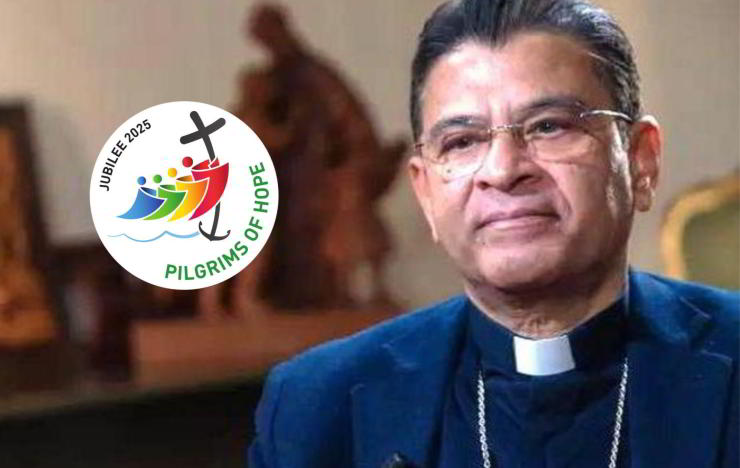
The Nicaraguan bishop, Monsignor Rolando Álvarez Lagos, who has been living in exile since January 2024, is among the most prominent victims of the religious persecution carried out by the dictatorship of President Daniel Ortega and his wife, Rosario Murillo, against the Catholic Church since 2018.
If there is one person that Daniel Ortega and his wife Rosario Murillo, co-presidents of Nicaragua, would like to see locked up for life, it is Monsignor Rolando Álvarez Lagos. Since the uprisings of April 2018, the bishop has been a thorn in the side of the two dictators. They imprisoned him, tortured him, expelled him, and stripped him of his Nicaraguan citizenship. Monsignor Alvarez’s response: “I am still the bishop of Matagalpa and apostolic administrator of Estelí.”
Álvarez was born on 27 November 1966, in a simple home in Managua. His father, Miguel, was a worker involved in the charismatic renewal movement, while his mother, Angela, attended the Neocatechumenal Way and sold a traditional drink made from corn and water.
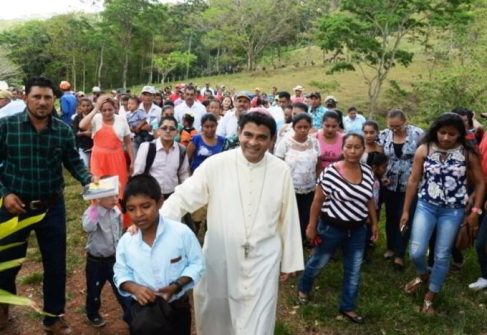
Monsignor Rolando Álvarez during a visit to a Christian community in the rural area. Photo: Óscar Navarrete/La Prensa
On 13 September 1983, the first government of the Sandinista National Liberation Front passed a law on Patriotic Military Service to recruit thousands of young men and use them to confront the counterrevolutionaries, otherwise known as the Contras. Álvarez, almost 17 at the time, belonged to a Catholic youth group that expressed his opposition to this regime’s order. He recalled that his father offered to take him out of the country two days before the law came into effect. However, the young man chose to stay in Nicaragua.
Álvarez refused to perform military service and was arrested several times. His house was raided, and the persecution his family suffered forced him to take refuge in Guatemala, where he would later reunite with his relatives. In Guatemala, Álvarez completed high school and began his studies in philosophy at the National Major Seminary of Our Lady of the Assumption in Guatemala City. He obtained a bachelor’s degree in theology from the Pontifical Lateran University in Rome and a degree in philosophy from the Pontifical Gregorian University.
On 7 December 1994, in the Metropolitan Cathedral of the Immaculate Conception of Mary of the Archdiocese of Managua, Álvarez was ordained a priest at the age of 28.He worked as a professor and prefect at the Managua seminary from 1994 to 2006 and directed Catholic Radio of Nicaragua beginning in 2001.
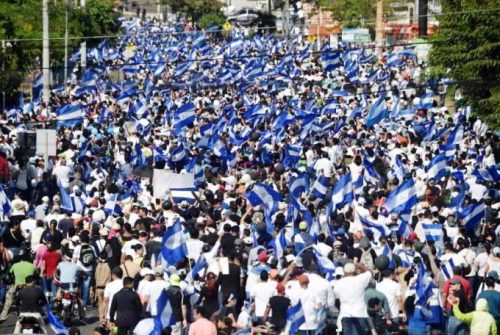
A crowd fills the street at a protest against the Ortega government in May 2018. CC BY-SA 2.0 /Jorge Mejía Peralta
In March 2011, Pope Benedict XVI named him bishop of Matagalpa and in July 2021, Pope Francis entrusted him with the apostolic administration of the Diocese of Estelí.In 2007, Ortega returned to power and although at first it seemed that relations with the Church had improved, two years later tensions flared again, especially due to the bishops’ criticism of the Sandinista leader’s continuous engineering of his re-election to maintain control of the country.The situation worsened from April 2018 onwards with demonstrations against pension and health reform. During the repression, which lasted several months, government agents besieged a church where a group of young people had taken refuge.
To resolve the crisis, the Catholic Church tried to mediate talks between the government and the opposition and Álvarez was one of the representatives chosen by the bishops. However, the talks failed and the crisis lasted for several months.
In June of that year, Álvarez denounced the attack on the Cartuja Pastoral Centre in Matagalpa. In addition, in September, a group of the regime’s supporters insulted him by calling him a “terrorist” and “murderer” when his car was stopped by a group of police on a highway.
In July 2019, the bishop said that during a pastoral visit to the community in La Joya, he was warned by locals that he was under surveillance by armed men.
Despite the harassment, the prelate continued his pastoral work and in February 2020 published an ethical decalogue for politicians in view of the November 7th elections of the following year.
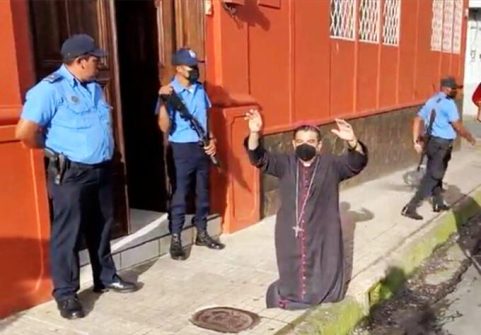
Bishop Rolando Álvarez of Nicaragua was sentenced to 26 Years in prison by Ortega Regime. (Photo: Matagalpa Media)
In June 2021, he called for tolerance, since “Nicaragua is experiencing serious and complex conflicts.” By then, the Nicaraguan police had confined three presidential candidates to their homes and the main opposition candidate, Cristina Chamorro, was under house arrest.
In mid-May 2022, Álvarez began a hunger strike because police harassment was also affecting his family. He said he would maintain his strike until the privacy of his family circle was respected.
On August 4th, Álvarez came out of his residence holding the Blessed Sacrament in a monstrance in response to the police not allowing his priests and collaborators to enter to celebrate Mass in the chancery chapel.After almost an hour of calling for dialogue and respect for the Church, the bishop went back inside and celebrated the Eucharist with his collaborators. Riot police stood outside the door and kept them confined in the residence until August 19th.
On the morning of August 19th, the police broke into the chancery and took Álvarez away, along with the priests, seminarians, and the layman who accompanied him. The bishop was transferred to Managua and placed under house arrest.
Despite concerns voiced by the Nicaraguan bishops and Pope Francis, during the following months, the prelate continued to be under pressure from the regime, which on February 10, 2023, sentenced him to 26 years and four months in prison, accusing him of “treason” and stripping him of Nicaraguan citizenship.
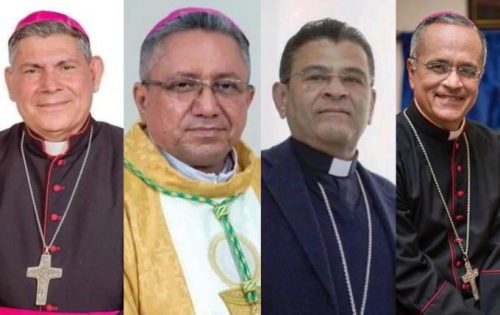
From the left: Mgr. Carlos Enrique Herrera Gutiérrez, bishop of Jinotega and president of the Episcopal Conference of Nicaragua, Mgr. Rolando Álvarez, bishop of Matagalpa, Mgr. Isidoro Mora, bishop of Siuna were expelled from the country. Mgr. Silvio José Báez, auxiliary bishop of Managua, also had to go into exile in 2019. File swm
The sentence was imposed one day after 222 political prisoners, including several priests, were deported to the United States. The bishop had refused to be part of the group and board the plane.
While the bishop of Matagalpa was imprisoned, the Vatican embassy was closed in Nicaragua on March 17th at the request of the Ortega government. During the following months, the Ortega dictatorship continued to put pressure on the Catholic Church, closing institutions and imprisoning more priests. Finally, on January 14th, 2024, local media reported that Álvarez had been deported to the Vatican, along with 15 priests and two seminarians, as well as the bishop of Siuna, Isidoro Mora. In a recent interview. Msgr. Rolando Álvarez said: “I arrived in Rome below zero, below zero in all my psychological, psychiatric, emotional, affective, sentimental, moral, spiritual, physical and somatic capacities. Now, a year later, I can say that I have recovered 90%”.
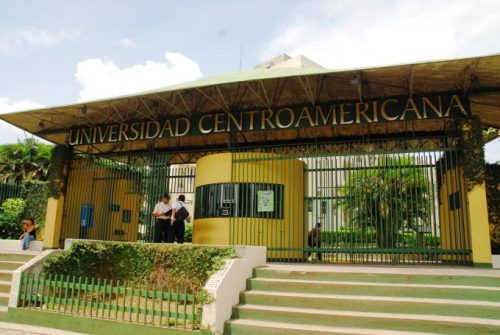
Ortega regime seizes a Catholic university accused of being ‘centre of terrorism’. File swm
And he continues: “In the same week of my arrival, I would have resigned from my diocese of Matagalpa and the apostolic administration of Estelí. I was ready to present my resignation to the Pope, but I was welcomed by the goodness of God and the Holy Father who wanted me to continue being the ordinary of Matagalpa and the apostolic administrator of Estelí, even though I was in the diaspora. I do not call it exile because I am not exiled, I am liberated. I do not feel exiled, but liberated. In the diaspora faith always grows and hope is strengthened. I have always believed in my liberation. In prison, I learned two things: it is a mistake to think that a prisoner will never get out, just as it is a mistake for a prisoner to think that he will never get out. What sustained me was prayer, not only mine, but that of all the faithful people of God in Nicaragua and in the world. I love my people deeply. I will continue to be bishop of Matagalpa and apostolic administrator of Estelí as long as God wants it.”
Recently, Mons. Álvarez delivered a powerful homily in Rome. The exiled bishop of Matagalpa, called for unity, forgiveness, and truth to mend the fractured Nicaraguan opposition in exile.
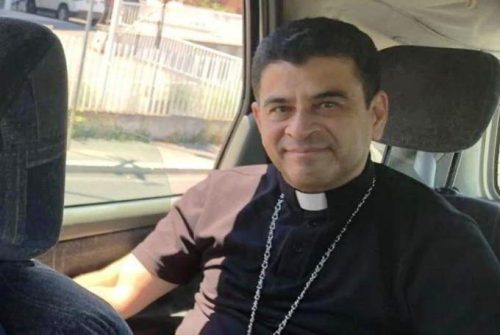
Bishop Álvarez: “I am not exiled, I am liberated”. Courtesy: Archdiocese of Managua
Talking about unity he said: “Unity is a manifestation of God’s action so that the World may believe.” He stressed that authentic unity requires genuine forgiveness, a process he described as both a gift and a necessity. “To be forgiven by God, to forgive, to be forgiven by others, and to forgive ourselves,” Álvarez said, outlining the spiritual steps needed to overcome division. Mons. Álvarez’s homily comes at a time when the Nicaraguan opposition in exile faces significant challenges in uniting against the regime of President Daniel Ortega. Recent failed attempts to regroup, coupled with tensions among opposition factions, underscore the urgency of his message.
His message, delivered from the heart of the Vatican, serves as both a spiritual and political call to action for Nicaraguans in exile and those resisting within the country. (Open Photo: Bishop Rolando Álvarez of Matalgalpa. Daniel Ibañez/CNA)
Pedro Santacruz



